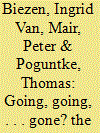| Srl | Item |
| 1 |
ID:
111498


|
|
|
|
|
| Publication |
2012.
|
| Summary/Abstract |
This article offers an overview of levels of party membership in European democracies at the end of the first decade of the twenty-first century and looks also at changes in these levels over time, comparing party membership today with figures from both 1980 and the late 1990s. While relying primarily on the direct and individual membership figures as reported by the parties themselves, the fit of the data with survey data is explored and it is concluded that the two perform well in terms of convergent validity. The differences between large and small democracies are examined, as well as old and new democracies, and it is found that levels of party membership are related to both the size and age of the democratic polity in question. Finally, the implications of the patterns observed in the membership data are discussed, and it is suggested that membership has now reached such a low ebb that it may no longer constitute a relevant indicator of party organisational capacity.
|
|
|
|
|
|
|
|
|
|
|
|
|
|
|
|
| 2 |
ID:
144829


|
|
|
|
|
| Summary/Abstract |
The British Labour party's recent adoption of a partially open primary for the selection of its leader conforms to a trend seen across many European political parties of increasing rights and privileges in internal party decision-making and expanding opportunities for more loosely affiliated supporters to participate in party activity. This dual trend can be seen as a response to changes in the membership environment, greater individualisation of political participation and growth in social movement politics and online activism. Yet as much as parties are responding to a changed membership environment, they are also driving that change, increasingly blurring the distinction between members and supporters. This article examines the recent impact of this change within the British Labour party and argues that, in line with Susan Scarrow's theory of ‘multi-speed’ membership, the Labour party's experiment in expanding affiliation options has led directly to a tension in locating the source of authority within the party, creating a challenge for its new leader in accommodating his new supporters within his party's representative traditions.
|
|
|
|
|
|
|
|
|
|
|
|
|
|
|
|